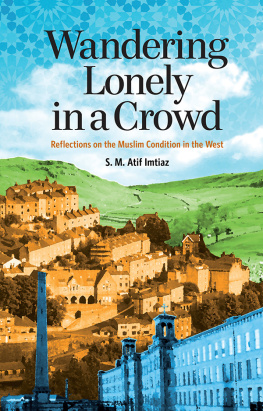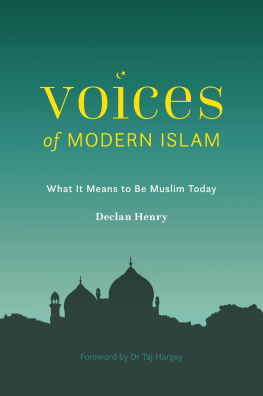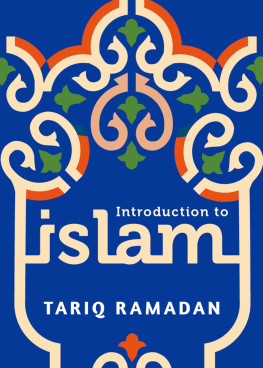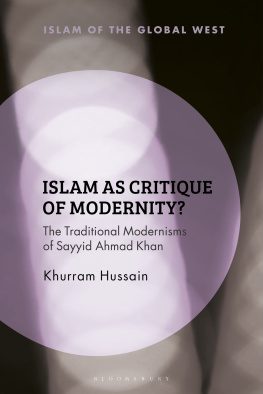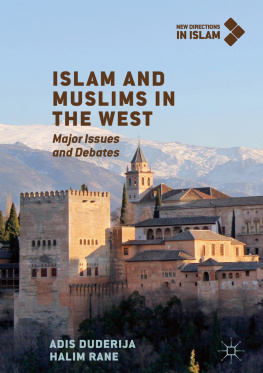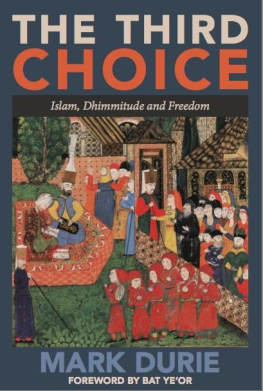First published in England by Kube Publishing Ltd.,
Markfield Conference Centre
Ratby Lane, Markfield,
Leicestershire LE67 9SY
United Kingdom
Tel: +44 (0) 1530 249230
Fax: +44 (0) 1530 249656
Website: www.kubepublishing.com
Email:
Copyright S.M. Atif Imtiaz, 2011
All rights reserved
The right of S.M. Atif Imtiaz to be identified as the author of this work has been asserted by him in accordance with the Copyright, Designs and Patents Act, 1988.
A Cataloguing-in-Publication data record is available from the British Library.
ISBN 978-1-84774-024-3 paperback
eISBN 978-1-84774-094-6
Typesetting: Naiem Qaddoura
Cover Design: Inspiral Design Ltd.
Despite all the raucous debate about Islam in Britain and British Muslims in the last decade, there has been far too little sustained reflection of real insight. Here is a precious sample of such reflection from Atif Imtiaz, whose combination of intellectualism and vivid reportage makes for a compelling mix. Who else would be reading Camus and Nietzsche on his way to the anti-war demonstrations in London from Bradford? He has an ear for the nuance of conversation and then applies a razor-like analysis to pick apart how people speak and what they are saying or would like to say.
Camus is not the only surprise in here. There are plenty more unpredictable juxtapositions. Indeed, the very structure of the book offers exactly that; the contrasts between styles of writing draw out the loose threads. Imtiaz, thank goodness, is not satisfied with easy conclusions. So we are offered a rich mix of ideas, influences, and people rather than neat ideology or argument. It provides a much better glimpse of the difficulties and confusions that Imtiaz and many others of his generation and background have had to navigate over the last 15 years.
From student radicalism in the nineties to being at the centre of national security in the 2000s, Imtiazs generation of British Muslims have had to confront issues of identity, belonging, loyalty, commitment and their faith in much harsher and more polarised terms than most. Nor does that journey seem to be over Imtiaz offers a way into the conversation rather than a destination. At its best, Wandering Lonely in a Crowd reads like eavesdropping in on a community which has too often been misrepresented, simplified and even, on occasion, demonised.
A careful thinker, drawing inspiration from many different sources including, of course, his Islamic faith, Imtiaz is one of those who is exploring and articulating what a twenty-first century Western expression of his religion might mean.
Madeleine Bunting
London
April 2010
His violence precedes his presence, to the eye at least. A shot rings out across the red, open desert. His bullet arrives before he does. But from where, the eye cannot tell. We know nothing of him, but we know his bullet. It has killed Lawrences guide as he drank from a well. He rides in, off the desert, and a speck on the horizon becomes a horse, a man riding a horse, an Arab. He descends from his horse, removes his scarf and we are introduced to Sherif Ali who will become Lawrences closest aide and companion throughout the rest of his adventures in David Leans Lawrence of Arabia.
The vague, the blurred, the background, the speck on the horizon, the almost irrelevant has assumed centre stage. What was previously the concern of a minority of academics and even fewer funding bodies has now become one of the most serious and crucial issues of our times. The consequences of this scrutiny remain unclear. As Geertz (2003) has highlighted in his review of some of the literature post-11th September:
What isnt clear, and will not become so for quite some time, is where it all is taking us, what our sense of this obscure and threatening Other that has appeared suddenly and literally on our domestic horizon is going ultimately to be.
So what is the focus of this book? It is to collect together a series of essays, short stories and speeches on two debates that focus on the Muslim community in Britain: the terrorism debate and the integration debate. Both debates have assumed prime political importance since 2001 due to the riots that took place in Oldham, Burnley and Bradford in the summer of that year and the terrorist attacks in New York and Washington. Before I proceed to introduce and describe the chapters of this book I would like to introduce my perspective on the context.
To paraphrase Denise Jodelet, a transformation in immigration policy swings open the doors of a country, and the social situation which emerges overturns mental attitudes whose roots are to be found in the distant past. The constant pulling and pushing, You are different to us!, We are the same as you!, the oscillation between the exacerbation and the reduction of difference the dialectics of the endogenisation of otherness and the consequences of this upon those who are represented as other, these are the themes that I will attempt to explore throughout this book.
How to understand Islam? It is Oriental, yet it is also Occidental. It is past, yet present. It refuses categorization: the nearest of the Eastern religions and the most modern of the old religions: it questions our assumptions. Though its origin in time and place is far, it draws near enough to confound the otherness that is placed upon it. If it is other, it is not completely so. This, however, has not prevented a historical proliferation of stereotypes of the Islamic world as attempts to pin down this denier of categories.
Charles Husband suggested, for example, that: historically derived stereotypes of Islam and the Orient are continuously latent within British popular culture and learning. Dolar writes in the introduction:
To continue this theme, Bryan Turner, a leading authority on Weber, concludes after examining Webers sociology of oriental society that the Orient simply lacks the positive ingredients of Western rationality. Oriental society can be defined as a system of absences.... worryingly irreconcilable difference is constantly being offered as an explanation for the actions of others. The argument moves from referring to individual cases to lists of examples to wholesale theories it is a construction of a narrative that is constantly being attempted at a time of great change.
Another major aspect of the context of these debates is the great social change that has occurred in Western society in general but in British society in particular. This social change could be termed the rise of excessive individualism, detraditionalisation, demoralisation or the hollowing out of modern society. The intellectuals and policy wonks involved in this debate are loathe to frame the debate in any manner which would encourage the return of religion (it was after all Durkheim as a founding father of sociology who warned against the excesses of individualism) and yet in many British cities there are now communities emerging that though they may have similarly been affected by the atmosphere of liberation that surrounds them present as real life alternatives to the problems of excessive individualism. They call for community and discipline but this also creates an anxiety around the return of authoritarianism and so the excessive communalism of these communities is criticised. This context that Islam in particular and religion in general may be a meaningful and practical response to excessive individualism also affects the terms, the style and the manner of the discussions that surround the community.

